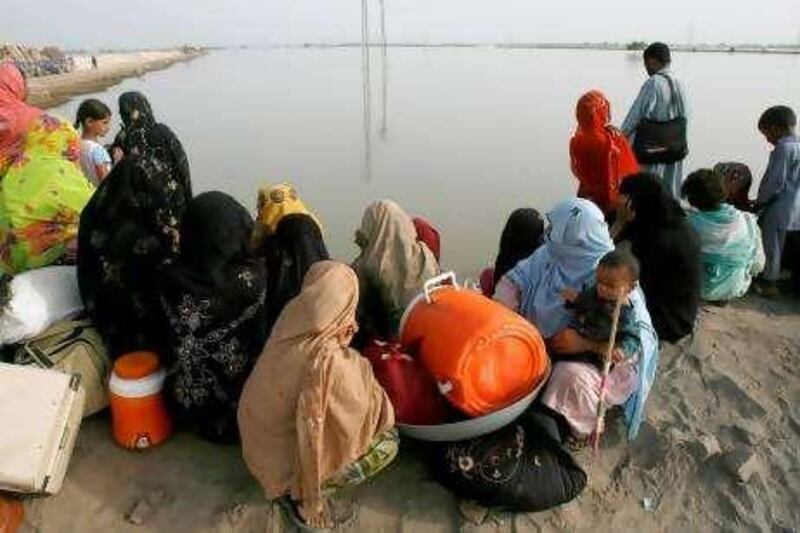ABU DHABI // When Iain Lawrie checked in for his Emirates flight on August 20, in addition to the clothes and sunscreen in his luggage, he was carrying a 50kg bag of rice and noodles. He was flying to Karachi to oversee the delivery of 10 Zodiac boats for the flood rescue efforts ? and he needed to bring his own food.
"I brought about 50 kilos of rice and noodles as excess baggage on the plane, just in case," said the Dubai-based brokerage manager at ART Marine, a yacht-chartering company. "We ended up eating some of it, because there was no food for us at the base we set up. We were giving all the food to the people." Mr Lawrie had been approached by an anonymous Pakistani donor to co-ordinate the donation of the dinghies to the Aman Foundation, a Karachi charity.
On the 22nd, Mr Lawrie boarded a Pakistan air force cargo plane with a British crew of rescue specialists and the first shipment of five Zodiacs from Dubai. Their destination was Jacobabad, in the north of Sindh province. A city of 500,000, Jacobabad has become a "ghost town", according to Pakistani press reports. With the area cut off by the floods, the only means of transport out is by boat. According Mr Lawrie, the scope of the flooding was hard to comprehend without seeing it.
"There was so much water," he said. "We flew over it for 20, 30 minutes and all you saw was mass flooding, and then you land and it continued for hundreds of miles. Any direction you looked, you only saw high points." Joining Mr Lawrie's team was a member of the Pakistani special forces, Commander Ali. He had been sent from Islamabad, where by his own account he spends his days "hunting Taliban", to Jacobabad to "baby-sit" Mr Lawrie and the rest of the rescuers.
The next afternoon the group set out to provide food, water and medical attention to people stranded by the floods. The weather was brutal. "The heat index was 58C. I had factor 60 sun cream all over my face and arms, but my arms are still bubbling up with water blisters and the skin is peeling off. It was that hot." Navigating through submerged towns in search of stranded people proved somewhat surreal, with only mosque towers and tall buildings visible above the water.
"We cruising under the high-tension power lines by two or three feet. I was navigating the dinghies by following submerged streets. "We found many, many people stuck on the roofs of buildings. We passed a prison that was completely flooded under 18 to 20 feet of water. "We ran into probably about 40 to 50 families in need of food and water all on roofs or stranded on pieces of road." Not everyone could be helped, though.
"There were some areas where the people were quite angry. You could see them screaming and shouting ? it was quite scary. "There were more than 50 to 100 people in those areas. We were told to drive past fast, because it was too dangerous to stop." When night fell, the team returned to Jacobabad, but soon ran into trouble. "We came to a wall in the first town. About a hundred people stood behind a barricade of rocks and burning tyres. They were trying to ambush us to get food from us."
Cmdr Ali and his fellow commandos dispersed the mob, and Mr Lawrie left for Karachi the next day to meet the latest shipment of his boats. Now back in Dubai raising funds to send generators and well pumps to help in the reconstruction of the flood-hit areas, Mr Lawrie says he feels a sense of humility after his trip to Pakistan. "In my profession, I sell yachts for up to 20, 30 million euros [Dh90m-140m]. All of a sudden I was thrown in with people who have less than nothing ? who are starving or drowning."
He was concerned to see severe bottlenecks in the distribution of relief supplies. The hangars at the air force base in Jacobabad are stuffed with food aid from around the world, but more comes in every day than gets out. "They only have so many helicopters, so many boats and only so far they can go each day, it is difficult to disburse the supplies they were getting." According to Mr Lawrie, there appeared to be too little co-ordination of rescue efforts. "It's chaos out there. You basically co-ordinate movements with your own connections." @Email:smclain@thenational.ae






